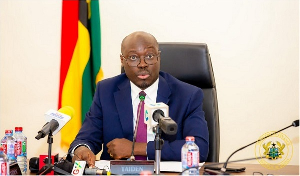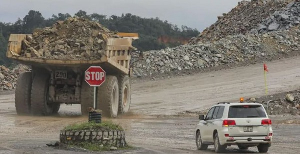Kaiser International, owners of the Volta Aluminium Company (VALCO) is reported to have made an offer to sell the company to the Government and people of Ghana.
President John Agyekum Kufuor, who announced this on December 21, 2003, said a Memorandum of Understanding (MoU) to this effect was to be signed later in that week. Kaiser's International Executive President and Legal Counsel, Mr Ed Houff made the offer when he visited Ghana in mid-December.
Kaiser Aluminium and Chemical Corporation has 90 per cent shares in VALCO, and this is what it has agreed to sell to Ghana. Aluminium Company of America (ALCOA) holds the remaining 10 per cent.
The Ministry of Information later announced that a committee of aluminium production experts would soon be appointed to make due diligence report to recommend how the Government could take over VALCO. VALCO, which is a major long-term investment in Ghana by Kaiser, is one of the largest private enterprises in country and is the second largest smelter in Sub-Saharan Africa. It is a major producer of primary aluminium for the world market. The company employed close to 2,000 people when in full capacity, 99.3 per cent of whom were Ghanaians, with 324 of them holding technical, professional and managerial positions.
The construction of VALCO began in 1964. The smelter shipped its first aluminium in 1967 and the plant has been expanded twice to its present design capacity of 200,000 metric tonnes a year and runs five pot lines. VALCO'S goals are to produce high-quality products, provide meaningful employment and career opportunities for its employees, assure the safety of its people and environment, contribute economically and socially to Ghana, and earn fair but reasonable returns for its shareholders.
The company is one of the nation's largest taxpayers, having contributed more than 10 per cent of Ghana's total tax receipts for a number of years. It is also a major purchaser of goods and services from local vendors amounting to upwards of five million dollars of procurement annually.
In an interview, a former Manager of VALCO, who is an engineer and past President of the Ghana Institute of Engineers, described the offer as difficult a situation. This is because all the raw materials for the production of aluminium ingots are expensive to import, this is one of the factors that has made the company expensive to run. The offer would have been very generous if Ghana produces alumina from the numerous large bauxite deposits in the country.
To accept the offer, Ghana needs to negotiate for the importation of 400,000 metric tonnes of alumina a year because the plant uses about 1,000 tonnes a day and this should be a continuous order.
The suggestion is that VALCO should be made to operate the plant for one year, before it hands over to Ghana, so that it could be continued from where they left off. This would help Ghana to continue to import the raw materials, as well as export the product to their customers. From GNA's interaction with experts it seems that VALCO is pulling out not because they are not interested in Ghana, but for the mere reason that the plant is now not economic enough to operate at profit. For, no multinational will continue its operation when it is making losses, and cannot determine how soon it can break even.
The present Government has found it necessary for an economic review of the tariff agreement to enable the Volta River Authority (VRA) to make enough money, so that it could continue to supply power. Few years back, VRA was receiving 40 million dollars annually from VALCO for the supply of electricity.
It is also a fact that the production of aluminium demands a lot of power supply but at cheaper cost. Therefore, if VALCO is to buy power at economic rate, automatically, Kaiser will be forced to fold up. VALCO currently uses 24 per cent of power generated from Akosombo.
VALCO concedes that the price it pays for electricity is lower per kilowatt hour when compared with other VRA consumers, its electrical energy cost is substantially lower than two-thirds of VALCO's competitors in the world aluminium market. It, however, pays higher electrical rates when compared to any other aluminium smelter in Africa.
There was a period of time when VALCO used to employ 1,900 workers, and at that time it had its own fleet of workers' buses that conveyed them to and from work, it had a laundry department that washed clothing and kitchen department which supplied food to workers, among other things. During that time, VALCO was operating at 11 man-hours per ton in production. The Management was forced to cut down to between four to five-man hours per ton, as is the practice at the plant in the United States of America.
This compelled VALCO to sublet some of the services to contractors to enable the company make about 1,000 US dollars for every ton of alumina that is produced.
power by VRA, reducing the company's production by 25 per cent. In October, 2002, VALCO took a difficult decision to improve efficiency to enable the company to remain competitive in the face of low aluminium prices coupled with low operating capacity for several months, by declaring 85 workers redundant.
By January 2003, VALCO which was operating on two pot lines with 950 employees, initiated a process to reduce manpower requirements, and on May 5, 2003, the Company took a decision for the curtailment of the last pot line to provide VRA with additional flexibility in meeting the needs of other power users in the country in the light of the low level of the Akosombo Dam. VALCO after its closure has only 310 workers, who have been retained to help in the maintenance of the plant.
The Ghana Minerals Commission is provided with 11 percent of VALCO's aluminium production estimated at 20 million dollars that is paid in local currency to serve aluminium industries in Ghana. Therefore, VALCO has become the foundation of over 50 million dollars aluminium industry in Ghana, which has about 100 user companies employing thousands of Ghanaians.
It is believed that the Kaiser's offer of VALCO has been due to the insistence that the Company should pay economic tariffs since the current price of three cents per unit is too low.
When the GNA asked Mr Francis Tuyee, a Chemical Engineer, to comment on the Government's acquisition of VALCO, he asked: "If VALCO's offer is accepted by the Government, will the cost of power be increased from three cents per unit as the Government is now forcing on the company? If not, we must allow VALCO to stay as it is because Ghana cannot run VALCO as has happened to a number of private companies that were taken over as well as the mismanagement of some state own enterprises which have been or are being divested."
On the exploitation of bauxite, President Kufuor is reported to have said Kaiser's offer would give Ghana the opportunity to exploit her bauxite deposits at Kyebi and Nyinahin, as well as step up production at Awaso. The President was further quoted as saying that the offer by Kaiser would mark Ghana's industrial birth.
It is pertinent to draw attention to the fact that mining and processing of local bauxite was part of the integrated plan of Kaiser at the inception of VALCO
However, at a certain point in time, when Kaiser looked at the economics of scale, even though it was found to be good, the capital outlay was so huge that it had to put the project on a complete hold. There was also the perception that if Kaiser produced alumina locally VALCO would have become strategic and Government could have taken it over easily as it did to some timber companies.
A number of experts GNA spoke to indicated that to exploit bauxite and process it into alumina in Ghana, there would be the need to provide rail lines and roads to the deposits, build the plant and construct entire townships with the necessary infrastructure facilities for the large army of workers to be employed.
They put the conservative estimate for such a project at about one billion dollars.
Mr Tuyee, who is also an expert on alumina processing, told the GNA that to process bauxite to obtain one kilogram of alumina one needed 250 grams of wheat flour or starch to evaporate the moisture.
For a plant to process bauxite to feed the VALCO plant with alumina in Ghana, it needs 100 megawatts of power which the country cannot immediately supply.
Mr Tuyee, therefore, suggested that what must be done was to get enough power for the nation, at reasonable price, so that industries could operate at their full capacities. VALCO has been operating under capacity for about a decade now because of inadequate power supply.
All said and done VALCO is a Ghanaian success story - an example of what can be accomplished when private enterprise and Government work together and find the formula for creating value. Can this success story continue to be told when the Government takes over?














